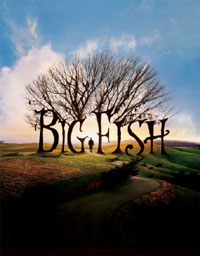 BIG FISH
BIG FISH(PG-13)
****1/2 (out of 5)
December 10, 2003
STARRING
Ewan McGregor as YOUNG EDWARD BLOOM
Albert Finney as SENIOR EDWARD BLOOM
Billy Crudup as WILLIAM BLOOM
Jessica Lange as SENIOR SANDRA BLOOM
Alison Lohman as YOUNG SANDRA BLOOM
Helena Bonham Carter as JENNY/THE WITCH
Directed by: Tim Burton
BY KEVIN CARR
One of the patients of Dr. Katz once said, “Do you remember when you were growing up and you thought your dad was Superman? Then you realized he was just a regular guy running around in tights.” This is the kind of person that “Big Fish” is made for.
All of us men remember when our fathers were the heroes in our lives. And now when we have our own sons, we love being the hero to them. However, we know that’s all going to fall away with adolescence. And while we may end up with excellent adult relationships with our own children, our superhero status will never be attained again.
“Big Fish” is the father-and-son story to beat all father-and-son stories. It has done for this generation what “Field of Dreams” did for the late 1980s.
One refreshing thing about “Big Fish” is that it deals with the father/son relationship without falling into the standard sports cliches. This isn’t another rehash of “Varsity Blues.” Hollywood seems to forget that not all young boys are pushed to be the star quarterback by their fathers desperately wishing to relive their youths.
Where “Field of Dreams” touched the lives of fathers and sons who spent many hours playing catch in the back yard, “Big Fish” will touch the lives of the writers, dreamers and artists. It is made for the sons who spent more time in movie theaters with their fathers than on baseball diamonds.
“Big Fish” is a tale of tall tales, most of them told by Edward Bloom (Ewan McGregor/Albert Finney). There are stories of how he saved his town from a giant, how he escaped Vietnam with a two-headed Asian lounge singer, how he braved the town’s witch to gaze into her glass eye so he could see how he would die.
Of course, most of the stories that Edward Bloom has told over the years have been elaborated upon, and the details have been lost to make way for other more interesting details. William Bloom (Billy Crudup) grew up listening to his father’s tall tales. Now, it is at the end of his father’s life, and William doesn’t even feel like he knows the man. A call from his mother regarding his father’s failing health calls William back to the South where he must reconcile with Edward.
During his journey back home, and the subsequent time at his father’s deathbed, we learn the history of Edward Bloom. However, the only way we could really learn the history is through Edward’s own tall tales.
“Big Fish” is a superb mixture of fantasy and reality. We all have known someone like Edward Bloom in our lives. We’ve all sat while someone tells a story that has an audience on the edge of our seats, but then thought to ourselves, “That’s not how it happened.” But when the audience is so enthralled, do we really want to burst that bubble.
The tall tales of Edward Bloom are mostly harmless, and in fact inspire people to be better. But William has faced lies and exaggerations all his life. We can all think to our own tall-tale-telling friend and think of the many times we’ve thought it would be nice to just hear the truth now and then.
While “Big Fish” is a Tim Burton film and shows some very clear Burton-esque styles of filmmaking, it is a departure from his standard faire. Instead of being oppressively dark (like so many films before like “Batman,” “Sleepy Hollow” and even “Planet of the Apes”), “Big Fish” is vibrant and colorful. It resists the urge to play the gothic feel (with the exception of the haunted forest and the witch’s house). In fact, the darkest moments are when Edward is wasting away at home in his bed. These moments are presented as dark and dismal in the way a rainy Saturday afternoon can be. In fact, it is in these moments that the hyper-reality of Edward Bloom’s fantasies washes away and leaves us in the depressing world of how things really are.
Ultimately, “Big Fish” is a story of redemption. It’s a story of a father finding his son again, where the son must learn to grow. And while the resolution of the film is hard to escape predictability, Burton achieves it without copping out or making a weak choice.
